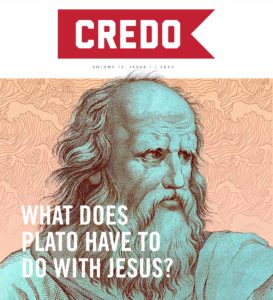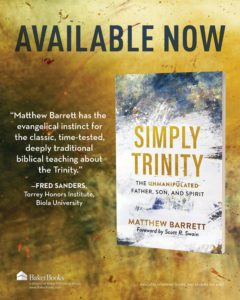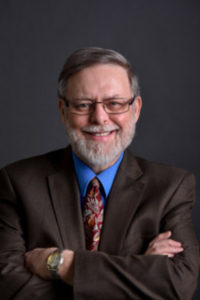
Why Should We Affirm Christian Platonism?
The latest issue of C redo Magazine focuses on Christian Platonism. The following is one of the issue’s featured articles by Craig A. Carter. Dr. Carter serves as Research Professor of Theology at Tyndale University in Toronto and as Theologian in Residence at Westney Heights Baptist Church.
redo Magazine focuses on Christian Platonism. The following is one of the issue’s featured articles by Craig A. Carter. Dr. Carter serves as Research Professor of Theology at Tyndale University in Toronto and as Theologian in Residence at Westney Heights Baptist Church.
What is Christian Platonism? Why do I advocate a return to it? Why is it so controversial today?
In this article, I will address these questions. First, I will focus on defining the term “Christian Platonism” and summarizing its development in the history of Christian thought. You may very well discover that it is not what you thought it was. Of course, my historiography can be questioned, but it would be good to remember that what I am presenting is the standard account shared by almost all your theological heroes prior to 1800. So, before you dismiss it, make sure you are not dismissing theologians you look to as orthodox and helpful to us today. (If you don’t have any theological heroes who worked prior to 1800, get some.)
Second, I will focus on systematic reasons why this metaphysical system is essential to the Christian doctrine of God as the transcendent Creator and also for basic elements of our culture that are based on the Christian doctrine of creation, such as the scientific enterprise and the natural moral law. I will also discuss the relationship of Christian philosophy to general and special revelation.
Historical Reasons
I first encountered this term by reading patristic theology where it is used as a fairly neutral historical description of how the fourth century pro-Nicene fathers made use of Platonic ideas in the Arian controversy and integrated certain of these ideas into their Trinitarian theology. Within the patristics guild there is no “moral panic” over the idea that Christianity and Platonism had dealings with one another. They have always known that Christian writers made use of certain Platonic ideas over against other ancient systems such as the atheism, materialism and relativism of figures like Lucretius, Democritus and Epicurus. This is not seen as a problem.
No reputable patristics scholar would say either that Christianity was absorbed into Platonism or that Christianity remained unaffected by it. The idea that Christian theologians did not, inevitably, interact critically with their surrounding culture would strike any historian as implausible. The question is which ideas are accepted, which are modified, and which are rejected totally. The idea that historical influence is a one-way street where Greek philosophy can influence Christian writers, but Christianity cannot in any way transform Greek thought, which seems to be an assumption made by many today, would strike patristic historians as completely unwarranted by the facts. As Robert Wilken puts it, the church fathers did not engage in the Hellenization of Christianity, but in the Christianization of Hellenism.
Let me make three, general, broad-brush assertions about Christian Platonism in history, even though there is hardly space here to go very deeply into any of them.
1. Christian Platonism is Historical Augustinianism
T he first point to make here is that Christian Platonism is a description of Augustinianism. Augustine’s theology was massively important for the West including both sides in the Reformation debates. So, if Augustine is a heretic, we are pretty much all heretics and we had better convert to Russian Orthodoxy en masse. (Of course, even then we would not have escaped the influence of Augustine’s metaphysics.) My point is that we need to understand that rejecting Christian Platonism means rejecting Augustine on a fundamental level and that is hardly feasible, since he is such a biblical theologian.
he first point to make here is that Christian Platonism is a description of Augustinianism. Augustine’s theology was massively important for the West including both sides in the Reformation debates. So, if Augustine is a heretic, we are pretty much all heretics and we had better convert to Russian Orthodoxy en masse. (Of course, even then we would not have escaped the influence of Augustine’s metaphysics.) My point is that we need to understand that rejecting Christian Platonism means rejecting Augustine on a fundamental level and that is hardly feasible, since he is such a biblical theologian.
I describe Augustine’s encounter with Platonism in chapter 3 of my book, Interpreting Scripture with the Great Tradition (Baker, 2018). I will not repeat that story here, but I just want to point out that Augustine used biblical revelation to supplement and correct the doctrines of the Platonists. What he accepted from them was the idea that the visible world depends for its existence on an intelligible world that is not known empirically, but only through reason. He found this concept to be compatible with Scripture but its metaphysical implications more developed and nuanced in Platonism. The Platonic concept of a spiritual substance helped him escape the Gnostic religion of Manichaeism, in which he had been caught up for nine years prior to his conversion.
Augustine accepted the Platonic idea that the creation is caused by a simple, immutable, eternal, self-existent First Cause and he identified that First Cause with the God of Scripture. He had to add the doctrines of Trinity, incarnation and atonement from special revelation and these elements constitute the uniquely “Christian” part of Christian Platonism. So, Augustinianism can be described as theology that uses certain Platonist ideas to develop the metaphysical implications of the biblical doctrine of creation. Augustinianism, in this sense, became an integral aspect of Christian orthodoxy.
2. Christian Platonism is the Metaphysics of Nicene Orthodoxy
The second point that needs to be made is that creedal orthodoxy is bound up with Christian Platonist metaphysics in ways that make disentangling them nearly impossible. Let me give just two quick examples.Augustinianism can be described as theology that uses certain Platonist ideas to develop the metaphysical implications of the biblical doctrine of creation. Click To Tweet
First, the doctrine of Divine simplicity, as Khaled Anatolios notes in his book Retrieving Nicaea (Baker, 2011), was taken for granted as true by all Christian theologians at the end of the third century. Throughout the fourth century debates, both sides continued to affirm it and both sides appealed to it in different ways to support their position. A key problem for the pro-Nicene side was how to give a non-contradictory account of the Father and Son as distinct from each other in some way but both sharing in the Divine simplicity. It is hardly a stretch to say that the homoousios versushypostasisdistinction was developed in part to address this very issue. So, to look at simplicity as an optional doctrine or to see it as revisable by modern theologians is to open up a very large can of very big worms.
Modern theologians who seek to revise classical theism by abandoning or re-defining the doctrine of simplicity, often without being aware of how it functions in fourth and fifth century Nicene theology, think that what they are doing has nothing to do with the doctrine of the Trinity. They think that they can deny simplicity while remaining within Nicene orthodoxy, but they are unaware of the fact that this is not actually possible. My point is that the doctrine of the Trinity does not work in just any metaphysical system whatsoever. Modern naturalism imposes metaphysical constraints on the Christian doctrine of God that make Nicene Trinitarianism impossible to maintain. This issue is too seldom addressed by those with revisionist aspirations. Christian Platonism is ecumenical, Christian metaphysics. Click To Tweet
Second, another example is the doctrine of creation ex nihilo, which is being questioned all over the place today even by conservative reformed and evangelical theologians such as John Walton. I readily admit that creation ex nihilo does not comport well with the Hegelian pantheism and panentheism, that is often conflated with the “scientific” view of the God-world relationship. In such cases, the doctrine of creation ex nihilo is working exactly as it was designed to do. Creation ex nihilo is a metaphysical implication of the doctrine of creation as derived exegetically from Scripture. It is a rejection of all mythological views of God in which God and the world are on the same plane of being interacting with each other in the way that creatures mutually affect one another. If this causes friction with “modern science” that is not because modern science is scientific, but rather because modern scientists are pantheists, which is a very different matter.
I think it is worth pointing out that much of the hostility directed against Christian Platonism (and subsets of it such as Thomism) originates in a desire to avoid challenging modern metaphysical doctrines such as panentheism, naturalism or materialism. Once a person decides to take these false doctrines on, one will find Christian Platonism to be an ally worth having in that fight.
3. Christian Platonism Underlies Scholastic Realism
A third historical point we need to emphasize is that what I am calling Christian Platonism is a very general system of metaphysics that has assumed various forms throughout history. It is broader and older than Thomism and rooted in the patristic, rather than the medieval, period. It also, for that reason, is less likely to be conflated with Roman Catholicism. It actually undergirds Eastern Orthodoxy and Protestantism just as much as it does Roman Catholicism. Christian Platonism is ecumenical, Christian metaphysics.
It cannot be stressed too often that Christian Platonism is not unmodified or unreformed Platonism. Modern writers only display their ignorance of over a thousand years of historical development when they assume that the Great Tradition simply assimilated Christianity to Greek philosophy. They are repeating a charge that was leveled at the Trinitarian and Christological orthodoxy of the creedal tradition by nineteenth century liberal theologians who were eager to dismiss the doctrines of Trinity, creation, incarnation and atonement and replace them with watered-down, non-biblical, liberal theology – what J. G. Machen would later call “another religion.” So, we should note, Christian Platonism has exactly the same enemies as Nicene Trinitarianism and, as we have already seen, this is hardly an accident.
Probably the most widespread and successful form that Christian Platonism has taken historically is Thomism. The synthesis of faith and reason in the work of Thomas Aquinas in the thirteenth century is a high point in the development of the Christian tradition. Scholastic realism developed on the basis of Augustinianism throughout the Middle Ages and went through a crisis because of the introduction of many previously forgotten manuscripts of Aristotle’s writings into the West. Aristotle was a Platonist, but initially many aspects of his thought seemed to threaten the Christian Platonism of the Middle Ages. It was the task of Thomas Aquinas to receive Aristotle, comment on his writings, integrate some of insights into Christian thought and reject some of his doctrines (such as the eternality of creation). Thomas did this so brilliantly and so thoroughly that his Augustinian-Aristotelian synthesis has been of central importance in Christian theology ever since. Pope Leo XIII’s call for a recovery of the thought of Thomas Aquinas resulted in a major revival of Thomism in Roman Catholic, especially French Dominican, circles during the twentieth century.Modern writers only display their ignorance of over a thousand years of historical development when they assume that the Great Tradition simply assimilated Christianity to Greek philosophy. Click To Tweet
Something interesting is now happening in the twenty-first century in reformed and evangelical circles that would have been difficult to predict forty years ago. The post-Reformation scholastic theologians are being rediscovered. All of a sudden, a tradition dominated for a century by an ahistorical biblicism is reading Vermigli, Junius, Voetius, von Mastricht, Perkins, Owens, and Turretin. Who saw that coming? A revival of scholastic realism is taking place today in front of our very eyes!
Post-Reformation reformed scholasticism makes extensive use of the basic ideas of Thomas Aquinas and is thus is rooted in patristic-medieval thought. Nothing shows the lie that Protestantism is not catholic orthodoxy more effectively than pointing to its historical roots in the pro-Nicene theology of the fourth century, Augustine, Aquinas and so on. We can trace a living tradition back to Justin Martyr and Irenaeus that sprang out of the New Testament, which itself is an interpretation of the Hebrew Scriptures in the light of the incarnation of Yahweh in the person of Jesus Christ.
Conservative Evangelical and confessional Protestant theology today stands at a crossroads. One direction open to us is the way of accommodation to modernity and the revisionist liberal project that has been pursued with disastrous results by liberal Protestants since Schleiermacher. Entire denominations are literally dying of this poisonous witch’s brew of paganism and biblical ideas. The other direction opening up before us is the path of Ressourcement, that is, the path of recovering the riches of scholastic realism and thus connecting back to the confessions of the Reformation period and the Trinitarian and Christological theology of creedal orthodoxy. This path allows us to connect to the catholic heritage of the Great Tradition by means of post-Reformation scholasticism, which in turn draws on the best of the synthesis of Thomas Aquinas, the Christian Platonism of Augustine and the pro-Nicene theology of the fourth century.
Why should we affirm Christian Platonism today? We should do so, not because we desire to place Greek philosophical ideas above biblical revelation, but because we recognize that orthodox Christianity has definite metaphysical implications that have been worked out carefully over two millennia and we dare not ignore the wisdom of this tradition if we want to be faithful as we continue to inhabit the Great Tradition in the twenty-first century.

